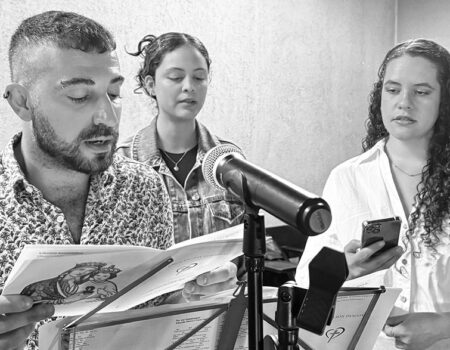Initial Formation: Initial formation and mental health
Friday June 27, 2025


Our Congregation’s current document on training, entitled ‘Emmaus: training of the heart’ (2023), presents training in two stages: initial training and continuing training. The section devoted to initial formation is the most extensive. From the Aspirant stage to the Post-Novitiate, via the Pre-Novitiate and Novitiate, several sections are dedicated to the psychological aspects of the formation process of young people. A few aspects deserve our attention and should be highlighted in the context of this reflection:
· At the Aspirant level, the stage of Encounter, it is noted: “… become aware of one’s history, significant experiences in one’s life, physical and mental health, and motivations for continuing to be accompanied. (Emmaus, 2.2.).
· At the Pre-Novitiate, the stage of Intimacy, it is written: ‘… For this reason, it is necessary that, during this stage or in the early phases of the pre-novitiate, a complete psychological assessment be carried out by a qualified person.’ (Emmaus, 5.1-2).
· In the Novitiate, a stage devoted to Conversion, the document emphasises the psychological dimension in these terms: “…the aim is “consistency” between “ideas and behaviour”. This requires the development of emotional and affective stability, a capacity for intimacy and balanced relationships, and that they themselves clarify their identity and sexual orientation (Emmaus, 12.3).
· In the Post-Novitiate, the stage preparing for the Mission, accompaniment is specified as follows: ‘This accompaniment will pay attention to the following elements: sound and realistic judgement, psychosexual integration and healthy affectivity, autonomy, sense of responsibility and co-responsibility, self-knowledge and acceptance, and personal integration…’ (Emmaus, 20.2).
This emphasis on taking psychological dimensions into account in the formation process reveals the importance that our Congregation attaches to the integral well-being of the human person. In this article, we focus on initial formation and mental health.
According to the WHO Constitution, ‘health is a state of complete physical, mental and social well-being and not merely the absence of disease or infirmity.’ This means that there is an interdependence between the physiological, psychological and social dimensions of health. In this context, we will focus on the psychological or mental aspect of health. Mental health is a complex concept, and its definition depends not only on the theoretical framework in which it is situated, but also on societies, eras and contexts.
According to the WHO (2009), ‘mental health is a state of well-being in which every individual realises his or her own abilities, can cope with the normal stresses of life, can work productively and is able to make a contribution to his or her own community.’ In this sense, a person with good mental health is someone who can adapt to the various situations in their life, including frustrations and joys, difficult times and problems to be solved. It is important to note that this definition of mental health extends far beyond merely the absence of mental illness. Indeed, a person can be in poor mental health without displaying clinical symptoms of ‘mental disorders or illnesses’ such as schizophrenia or depression. Mental health encompasses aspects related to well-being, joie de vivre, optimism, self-confidence, interpersonal skills and emotional regulation. It is not a fixed state but a continual search for balance between constraints and resources (Pereira et al. 2021).
For our part, by ‘mental health’ we mean the consistent way of thinking, feeling, reacting, interacting, and interpreting events and situations. This way of thinking can be good or bad (pathological). We should avoid the confusion that is often made between ‘mental health’ and ‘mental illness’. These concepts are similar but distinct.
At this stage of our reflection, we may ask ourselves: Why discuss mental health in initial training?
In our Congregation of the Missionaries of the Sacred Heart of Jesus, initial formation begins with an encounter between a candidate and a representative of the Congregation. Under normal circumstances, at the Aspirant stage, we primarily welcome young adults, i.e., young people who have recently left adolescence. Psychologically, however, every transition from one stage of life to another, and especially adolescence, is often accompanied by crises of many kinds. These crises, which are nevertheless necessary for psychological and human maturation, can have problematic or pathogenic consequences for some people. This is why it is essential to consider the uniqueness of each candidate we welcome.
Initial training prepares young people for their mission. This period of preparation should bring together all the ingredients necessary for a coherent missionary experience. In other words, during initial training, conditions must be created that enable good mental health in both the present and the future. In practical terms, we must avoid creating or maintaining situations that generate frustration or latent wounds, which can lead to mental health problems in adulthood. Psychological science teaches us that some mental health problems, even some ‘severe mental illnesses,’ have their roots in early childhood or adolescence. Each of us is what our history makes us.
My experience as a trainer has shown me that some young people arrive with a heavy and painful background. Others come from problematic family backgrounds, while others still come from areas or regions of armed conflict or war-torn countries where violence is the law. In short, some young people have experienced events with a high potential for trauma. In this sense, a training centre should also become a ‘hostel that heals’ psychological wounds. Suppose it cannot fulfil this therapeutic mission. In that case, a training centre should at least achieve a diagnostic mission, i.e. enable each candidate to become aware of their painful past, to verbalise it and, if possible, to refer them to a mental health specialist so that they can receive adequate and effective help (see Emmaüs). This is where the need for training for trainers arises, as they are called upon to accompany, support, and guide young people in their training.
During initial training, trainers should at least be able to identify the ‘red flags’ or symptoms of possible mental health problems. This task is essential, but trainers should also raise awareness and educate young people in training to develop and maintain good mental hygiene through a balanced approach that combines spiritual and academic activities, relaxation, and good personal and environmental hygiene. Isn’t there an old saying that ‘a healthy mind in a healthy body’?
With this in mind, the preventive dimension will enable the entire Community to avoid becoming ‘firefighters’ when serious mental health difficulties arise among its members. Today, some of our colleagues suffer from mental health problems such as addiction to substances (alcohol, tobacco, cocaine) and objects (telephones, television, etc.). Do we really think that this has started today? Certainly not. We must realise that there can be no effective and fruitful mission without the good mental health of its members. We can train members intellectually and spiritually, but if we neglect their psychological and emotional well-being, we will create ‘monsters’. Later on, the price we will pay is that we will spend most of our time solving avoidable problems. As a result, at the leadership level, the energy that should be directed towards planning and working for the emergence of our religious family will be invested in the treatment and follow-up of ‘difficult cases’. Prevention is better than cure, as the saying goes.
In conclusion, far from wanting to provide solutions to this very complex issue, our aim was to raise collective awareness of the importance of mental health during initial formation. Very often, we see confusion between ‘spiritual problems’ and mental health problems. This confusion is sometimes due to the stigma attached to the field of psychology in certain parts of the world. Today, we must recognise that clinical psychology serves mental health through awareness, promotion, diagnosis, care and follow-up or support for people facing mental health problems. Mental health issues affect us all, but to varying degrees. We must therefore provide everyone with appropriate spaces to talk about their painful experiences, while paying attention to aspects such as conflict management, the exercise of authority, living and working conditions, etc., which can become risk factors for mental health problems.
Didier Mbela Bongoy, MSC (Congo)
Photo: www.freepik.com





